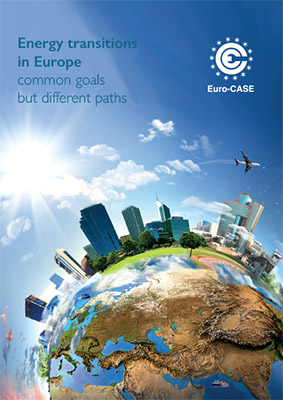Energy: a treasure of humanity
The Euro-CASE Energy Platform is chaired by Prof. Eberhard Umbach, acatech
Working Group members:
- Chairman: Eberhard Umbach (Germany)
- Eloy Alvarez (Spain), Jean-François Minster (France), John Loughhead (UK), Karin Byman (Sweden), Krzysztof Galos (Poland), Miodrag Mesarovic (Serbia), Zoran Marinšek (Slovenia).
- Sherpa: Karin Schätzler and Wolf Gehrisch provides support.
The Energy Platform has been working on different actions including an analysis of the staregioes of Eurtopean Countries in the context of a European Energy Cooperation.
Meetings took place in Paris (26.04.2018), Stokholm (28-29.06.2018) and Madrid (28-29.09.2018).
Meeting took place in Paris (14.01.2019)
Euro-CASE Policy Position Paper
Reform Options for the European Emissions Trading System (EU ETS)
The central pillar of European climate policy, the European Emissions Trading System (EU ETS), is currently questioned in its ability to deliver its objectives as the allowance price is persistently low at around 5€ / tCO2. The cap was met and emissions actually declined in recent years, ensuring the environmental effectiveness of the scheme. However, the low price may affect the long-term cost-effectiveness of the instrument by reducing the incentive for investment and deployment of low carbon technologies. Consequently, no significant increase in the EU ETS allowance price is expected before 2020, and probably not beyond, without reform. While the reasons for the price decline are controversial, empirical analysis shows that only a small proportion of price fluctuations can be explained by factors such as the economic crisis, renewable deployment or international offsets. Therefore, it is likely that political factors and regulatory uncertainty have played a key role in the price decline. As a consequence, any reform of the EU ETS has to deliver a mechanism that reduces such uncertainty and stabilizes expectations of market participants. The Market Stability Reserve as proposed by the EU Commission is unlikely to address the problem of the low price, and the uncertainty of future price development remains substantial. The ability of the Market Stability Reserve to deliver long-term cost-effectiveness is thus questionable.
Energy transitions in Europe
common goals but different paths
Euro-CASE Energy Platform
1. Foreword
2. Scope and purpose of the paper
3. Energy systems in the EU
4. Vision of the EU and the European Commission
5. Energy transitions in Europe
5.1 France
5.2 Germany
5.3 Poland
5.4 Serbia
5.5 Slovenia
5.6 Spain
5.7 Sweden
6. Comparison and concluding remarks
Annex:
Glossary of terms
Energy Platform Members ans Staff
Mission Statement & Governance
Member Academies




